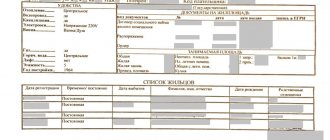The issue of deregistration or deregistration of children under the age of majority from an apartment is not an easy process. It has many nuances due to various situations. You will need some knowledge regarding existing legislation to fully understand how to remove a minor child from the owner’s apartment. The upcoming deregistration process will require compliance with certain formalities, as well as documentary evidence that deregistration of children under the age of majority will not violate their rights.
Is it possible to expel someone else's minor child from the apartment?
In accordance with Art.
20 of the Civil Code of the Russian Federation, a citizen of the Russian Federation who has not reached 14 years of age must live with his parents or legal representatives (adoptive parents, guardians). If the mother and father are registered in different places, then the child is registered with any of them. In this case, the consent of other residents is not required (Article 70 of the Housing Code of the Russian Federation). Reference! The question of deregistering a child usually arises when selling a property. A minor can only be discharged if he is immediately registered in another house or apartment. The owner has the right to dispose of the property at his own discretion.
Before the sale, he must register all registered citizens. If, when deregistering a minor, the legal norms are not observed, then his rights can subsequently be forcibly restored through the court.
In which cases?
Discharge of a baby is often required when a family changes their place of residence, purchases a new apartment or house with a subsequent move, or divorces.
The last case is the most difficult, since the former spouses should resolve not only the issue of the child’s residence and the schedule of his communication with the second parent , but also the issue of registration.
Despite the divorce, the baby can be registered with both the mother and the father.
In a situation with an adult, the procedure would not take much time and would only require a passport and a desire to be discharged. When it comes to a child, things are a little different. Let's figure out what the difference is.
Check out options
The owner can remove a minor from his apartment in two ways:
- voluntarily with the consent of the parents;
- through the court.
Each procedure has its own characteristics.
Voluntarily
To discharge a child, the consent of both parents is required, even if they do not live together. A minor under 14 years of age must be registered at the same address where the mother or father is registered. Only his legal representative must be present at discharge.
Children from 14 to 18 years old must sign documents independently, but in the presence of their parents, guardians or adoptive parents. To deregister, you must confirm that the child will be registered in another place.
Discharge of a child voluntarily involves the following actions:
- Submitting documents to the passport office or MFC.
- Filling out the departure form.
- Receive documents on time.
- Registration of a minor at a different address.
When writing an application, you must provide the following documents:
- parents' identity card;
- birth certificate or passport of the minor;
- extract from the Unified State Register of Real Estate;
- title documents for the apartment.
The presence of the property owner when deregistering a minor is not required.
through the court
If the parents do not agree with the discharge of the child, the matter can only be resolved through the court. The claim is filed by the owner of the apartment. A minor can be deregistered only if there is a legal basis that the child’s right to use the property has been lost or terminated.
The application is submitted at the defendant’s place of residence. Guardianship authorities must participate in the proceedings.
It will not be possible to discharge a child through the court in the following cases:
- a minor participated in the privatization of an apartment;
- there is no other place to stay;
- the child has lost his parents and no guardian has been appointed;
- the minor is one of the owners;
- the child is dependent on the owner of the property.
Each situation is considered by the judge individually, so the official will not always side with the plaintiff.
How to obtain permission from the guardianship authorities?
The removal of a minor from the living space requires approval from the guardianship and trusteeship authority. To obtain permission, both parents must contact the Office of Guardianship and Trusteeship, except in situations where one of them is deprived of parental rights. The application indicates the new place of registration. Documents for new housing are provided as confirmation.
Attached to the application:
- passports of the child’s representatives;
- birth certificate or passport (upon reaching 14 years of age) of the child;
- an extract from the personal account at the old place of residence;
- documents for new housing.
Review of documents takes up to 2 weeks. Then the applicants are invited to the guardianship and trusteeship authority for an interview and obtaining permission or prohibition. If the child is over 14 years old, he must also be present.
How to discharge a child from your apartment through the court?
To forcefully discharge a minor, you will need:
- Submit a claim.
- Pay a state fee of 300 rubles. (Article 333.19 of the Tax Code of the Russian Federation).
- Confirm with documents or testimony all the circumstances of the case.
- Participate in court hearings.
- Obtain a decision from an official.
- Submit documents to the registration authority.
When considering a case in court, representatives of the guardianship and trusteeship authorities are involved. If one of the participants in the process does not agree with the decision, he can appeal it within the prescribed period.
sample claim
The statement of claim is drawn up in accordance with the requirements of Art. 131 Code of Civil Procedure of the Russian Federation.
It should contain the following information:
- name of the court department;
- information about the plaintiff and defendant;
- circumstances of the case;
- evidence of violation of citizen's rights;
- plaintiff's claims;
- list of applications;
- date and signature.
List of documents
The following documents are attached to the claim.
| No. | Name |
| 1 | Passport |
| 2 | Receipt |
| 3 | Apartment purchase and sale agreement, gift, certificate of inheritance |
| 4 | Extract from the Unified State Register of Real Estate |
The plaintiff may submit other documents confirming the circumstances of the case.
court hearing
After accepting the claim, the judge will set a hearing date. Both parties are notified of the time and place. The absence of any participant at the trial without a valid reason is not a valid reason for adjourning the meeting.
After the end of the process, the parties receive a court decision. You are given 1 month to appeal it (Article 321 of the Code of Civil Procedure of the Russian Federation). If no complaint is received, it will come into force (Article 209 of the Code of Civil Procedure of the Russian Federation).
Important! After filing a claim in court, the owner must wait for the decision to enter into force. After this, he can submit documents to the registration service and discharge the child.
Is it possible to register and register at the same time?
There is no need to wait to check out of the apartment with your child and register in another. This can be done at the same time. The law does not directly prohibit such a double procedure. On the contrary, the state is interested in speedy registration in a new location. In parallel with the deregistration from the previous apartment, you can immediately contact another division of the FMS.
The documents are similar to the package that is prepared for deregistration. FMS employees do not require a departure certificate or an application from your previous home.
The rule also works in the case of electronic housing registration. Online services also provide the opportunity for parallel registration and registration.
Arbitrage practice
the child was registered by the previous owner.
There are often situations where a minor remains registered in the apartment after it was sold. So, the spouses Vitaly and Olga went to court. They purchased an apartment and agreed with the former owners that they would check out within a certain time after the deal was concluded.
The previous tenants did not fulfill their obligations. Among them was a minor child.
The new owners went to court with a demand to forcefully deregister the residents. They referred to Art. 235 of the Civil Code of the Russian Federation, which states that the previous owners had their ownership rights terminated on the basis of a purchase and sale agreement. In Art. 292 of the Civil Code of the Russian Federation states that family members of the property owner must also stop using the residential premises.
In fact, the minor lives in another apartment with his parents. The court took into account all the circumstances of the case and made a decision in favor of the plaintiff.
child – grandson or granddaughter of the owner
A grandson or granddaughter is a member of the owner's family. Therefore, it will be problematic to discharge the child. These points are indicated in the Resolution of the Plenum of the Supreme Court No. 14 of 07/02/2009.
Attention! It is believed that family ties between grandparents and a grandson cannot be terminated, even if they live separately. In this case, the child can be discharged only after he reaches adulthood.
the child is not a relative
In court, the owner can discharge a child who is not his relative. That is, it will be possible to discharge your wife’s child from her first marriage through the court after a divorce, but not your own.
In Art. 31 of the RF Housing Code states that former family members cannot use the premises unless otherwise provided in the agreement concluded between them. Therefore, the courts, in most cases, take the side of the plaintiff.
Why are children not deregistered from the apartment?
To summarize, we can state that the court will not allow the deregistration of a citizen who is under 18 years of age in the following situations:
- lack of a positive decision issued by the guardianship council;
- a citizen under 18 years of age is not provided with other living space;
- Living conditions are deteriorating.
Read the real story and find out how to properly plan a budget for a poor student from Vladivostok by clicking on the link here
Underwater rocks
When discharging a minor, the following nuances must be taken into account:
- If the child does not live in the apartment, this must be indicated in the statement of claim. You should also indicate the address of the minor’s actual location if it is known.
- The summons to court arrives at the defendant’s place of residence. Accordingly, if the new address of the minor and his parents is unknown, then notifications will be sent to the disputed apartment where they are registered. The court will still consider them notified of the place and date of the hearing. If the defendant does not attend the hearing, a default judgment may be entered.
- Drawing up a claim requires legal knowledge. Experts recommend indicating in the text references to regulations that were violated by the defendant.
Legislation
Children's rights are protected by many laws, both federal and international. This is understandable, because they cannot stand up for themselves, and in many cases their age does not allow them to make certain decisions.
The main regulations that regulate and protect the rights of children:
- Constitution of the Russian Federation.
- Family code.
- Housing Code.
- Orders, decrees of the President of the Russian Federation, which mention the specifics of the activities of institutions responsible for registration and deregistration.
- UN Declaration on the Rights of the Child.
Can't do without a lawyer
If all of the above conditions are met, this increases the chances by only half. If not less. The main difficulty in court is that EVERYTHING NEEDS TO BE PROVED IN WRITING. The judge will not believe the words. Especially when the rights of the child are affected.
Written evidence is certain certificates and acts from various government departments and organizations. An ordinary citizen will not be able to obtain most documents because he does not have the status and authority to do so. More precisely, he can make a request, but they will not answer it, because they are not obliged to. A lawyer will come to the rescue. He, having a special status, will make inquiries about organizations - paragraphs. 1 clause 3 art. 6 and paragraph 5 of Art. 6.1 Federal Law of May 31, 2002 No. 63-FZ. Organizations are required to respond to requests from lawyers, otherwise they face a fine - Art. 5.39 Code of Administrative Offenses of the Russian Federation.
A lawyer will study your situation and make inquiries to those organizations that are beneficial to you. From the received answers, he will select the most useful ones. I indicated which organizations you need to contact in the instructions below.
In addition to collecting evidence, the hired lawyer will collect and legally competently draw up all the necessary documents (statement of claim, etc.), will participate in court for you and protect your interests, and will build a correct and advantageous position of behavior.
If you do not contact a lawyer, you can ask the judge to gather evidence. The judge will issue the requests, but will ask you to take them to the organizations, and then pick up the answers to them. He will ask, because... can't force it. You will not have the opportunity to postpone requests that are more profitable for you. And you won’t be able to filter the responses received either. You won't know most of the answers because they will be sealed in envelopes. All this greatly reduces your chances of winning your case.
The most important thing is that it is much CHEAPER to hire a lawyer and at the same time have a better chance in court than to give away your share later when privatizing the apartment. In the future, you can buy back the share if the owner agrees to sell it. In any case, it will cost more than the services of a lawyer.
Our law office "Bessonov and Partners" offers residents of Moscow or the region. We will take on all the possible work - we will draw up a correct statement of claim, collect all the necessary documents and submit them to the court. You will not need to come to court hearings; the office's lawyer will participate in them and will do everything possible to win the case. At the end of the trial, we will bring you a copy of the court decision.
We have been working in the field of court records since 2008 and have won 84% of court cases.
The cost of the service is 90 thousand rubles. For visitors to this site there is a discount of 5% to 10%. To receive it, say that you came from the website “Prozhim.com”. For all questions and for a free consultation, call 8 (495) 642-31-96 (daily from 9:00 to 21:00 Moscow time / only for residents of Moscow and the region).
Rules for filling out applications
The outcome of the case depends on whether the application to various authorities is drawn up correctly. Each of the statements has its own characteristics .
Claim in court
The application to the court is submitted at the actual place of residence of the child .
The claim must first of all be justified, therefore the application must indicate the requirements that comply with current legislation.
First of all, indicate the subject of the claim - recognition of the citizen as having lost the right to use the premises. This is what should be the subject of the lawsuit.
At the end of the application, ask the court to also recognize the minor as having lost the right to use the premises.
Discharge from the premises will occur subsequently on the basis of this decision, since the court does not discharge anyone, this will then be dealt with by the relevant authorities .
Further in the application, indicate the reasons for this decision.
We talked about how claims for forced deportation are drawn up in various situations in a separate article.
In the Federal Migration Service
An application to the Federal Migration Service is written by both parents and the child after 14 years of age. The easiest way to obtain such an extract is by registering at a new address.
In this case, citizens submit an application to the place of new registration with a request to register the minor.
Employees of the Federal Migration Service carry out registration, and deregistration from the old place of residence occurs automatically , without the participation of applicants.
To the guardianship authorities
The guardianship authorities should be contacted not with a request to discharge the child, but for permission to remove him from the registration register at the place of his previous registration.
After the request for permission , you should reasonably indicate the reasons for the discharge and be sure to indicate the new registration address . Without a substantiated description of the new registration address, it is impossible to obtain permission from the guardianship.
The guardianship authorities will not allow the child to be discharged without providing him with a place of residence.
It is necessary to attach to this application documents for the apartment and a personal statement from the owner about the desire to register a minor on his own territory.
Legal provisions
The Constitution of Russia and the RF IC are guarding the observance of children’s rights to housing. In accordance with legal provisions, persons under the age of majority must live with their mother and/or father or with a guardian at their registration address. In addition, the son or daughter has the rights to claim the property.
Representatives of children must carry out the registration procedure in their own area or in a municipal apartment in a similar place where they live independently. Supervision over compliance with this provision is carried out by the guardianship authorities in accordance with the Civil Code of Russia, in particular Article No. 20.
If mom and dad live and are registered at different addresses, the children must register at one of them. It is noteworthy that it is not necessary to obtain the consent of all tenants, as stated in Article No. 70 of the Housing Code of Russia.
Rules for registering a child
The first global rule is introduced by Article 20 of the Civil Code of the Russian Federation and applies to children under 14 years of age. It says that young children can only be registered with at least one parent . Read in detail about how a newborn child is registered in an apartment after birth, and from this article you will find out whether it is possible to register a child separately from his parents and without parents.
The second is the human right to housing, established by Article 40 of the Constitution, while the state especially monitors the observance of children’s rights.
Nuances and features of the procedure in the case of children
- Purchasing a residential property with an area larger than the previous one.
The Board of Trustees will approve such a choice , but only if the value of the child’s share does not decrease. When buying a small home, you will have to register a large part of it, including a smaller number of family members. - Respect for the interests of the minor . Living conditions in new housing should be no worse than previous ones.
- Opening a bank account . If, after the sale of the former apartment, it is not possible to immediately buy a new home, an amount equal to the value of the previously owned share should be deposited into the child’s account.
- Change of educational institution . When purchasing a new home, the family often moves to at least another area of the city. This entails a change of school or kindergarten. For this reason, the board of guardians always asks the child what he thinks about this.
- Illegal discharge . If for some reason it was possible to discharge a minor without the consent of the board of trustees, then in court it is possible to freely restore his registration.
- A child who has reached the age of fourteen can be discharged only at his own request and makes decisions independently .
Important! When a minor is deregistered, the law is always on his side. By observing all the rules and requirements of the current legislation of the Russian Federation, without infringing on the interests of the child, it will still be possible to safely discharge the child.
It will also be useful to familiarize yourself with the following information:
- How can a minor child be discharged from an apartment and what is needed to register him or her in another place?
- How to discharge a minor child from a municipal apartment?








